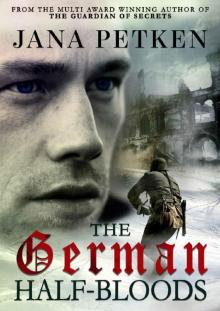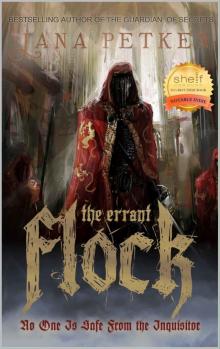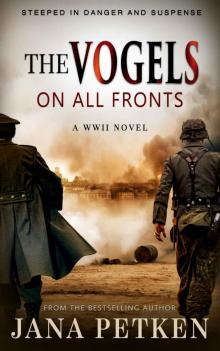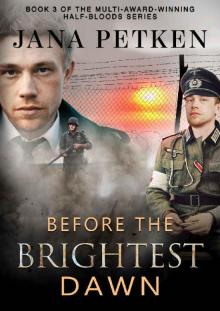- Home
- Jana Petken
The German Half-Bloods (The Half-Bloods Trilogy Book 1) Page 6
The German Half-Bloods (The Half-Bloods Trilogy Book 1) Read online
Page 6
Romek, sitting beside another man at the kitchen table, leapt to his feet when Max appeared at the door after Klara let him in. The two men shook hands, but then strangely emotional, embraced.
“Europe was at peace when you left, and now look at us. What the hell did you do?” croaked Romek, his eyebrows soaring.
Max removed his jacket, wincing as he pulled it off his shoulders.
“You look as bad as we feel, my friend,” said Romek, inspecting Max’s dirty, bloodied shirt. “Tell us what you saw out there.”
Max slumped into the chair. Romek poured him a mug of beer, and Klara brought a bowl with water, a cloth and bandages to the table.
“You’re hurt. Let me clean that for you,” said Klara, examining the gash on his neck.
“It’s just a scratch,” Max muttered, holding her eyes.
“It’s deep and caked in dried blood. You need a bath.”
“I’d love a hot bath, Klara, but I don’t have time.”
“This is my cousin, Bolek,” said Romek, nodding to the stranger. “He’s a doctor. He’ll look at your wound.”
Max waved Romek off. “Thank you, but it’s nothing. Klara will do a fine job.”
Max glanced at a heavily pregnant woman he’d never seen before. She was cutting vegetables into small pieces and hadn’t lifted her head to greet him when he’d arrived. Whatever she was cooking smelt good, Max thought, inhaling the aroma of the meat stock.
Klara set about cleaning Max’s wound. He sighed with relief, as he remembered the close calls he’d had on his mammoth journey. He’d covered a lot of ground in the past six days, driving from Warsaw all the way to the Baltic Sea, stopping at strategic locations on his route. He’d not slept in a bed or had a decent meal, for time had not been on his side. Troops heading towards the Polish Corridor had slowed his progress, an invasion had been imminent, and he’d wanted to finish the job and get back to Warsaw as quickly as possible before he found himself stuck in the middle of a battle.
Max’s superior, Jonathan Heller at MI6 headquarters, had given Max his orders on August 24th when he’d left on a plane for Warsaw. The mission, in part, was to get Romek and Klara to Paris. Heller had been adamant that Romek was too good an agent to leave behind in a country that could be overrun by Germans within days. Romek and Klara, a linguistic professor at Warsaw’s university, might have bigger roles to play in MI6 in the future, Heller had added without giving details. Thank God for Heller; he’d been right about the Germans, and he’d be proved right about Romek and Klara’s usefulness as well.
Max’s other mission had been of a technical nature. Those orders had come directly from the Foreign Minister, Lord Halifax, who had gone personally to MI6 headquarters to brief Max and Heller on the mission’s objectives. “I want you to study the Polish defences and borders for yourself. We need detailed maps. Ours are outdated and probably useless. Get every main road, military base, ship movement and train line.” The list had gone on and on until Max had felt compelled to interrupt. “That’s a lot of ground to cover in a week, My Lord.”
“Then I suggest you get cracking and don’t waste a minute of your time while you’re there,” Lord Halifax had responded. “We want you out of Poland before Germany drops its first bombs on Warsaw.”
Max had maintained at the time that it would be difficult to drive to every location on his own and had suggested that a second driver would come in handy. He’d have more time to draw his maps, some from brief notes and others entirely from memory, if he didn’t have to be behind the wheel. It had been a reasonable request, Max had thought, but it was denied all the same.
He’d worked his way around Poland in the guise of a cartographer contracted to the British Embassy in Warsaw. That wasn’t too far from the truth. He was an Army Major attached to MI6, but he was also a qualified cartographer with various degrees from Oxford University. He carried professional credentials from the London planning offices that he used as a cover, along with one of his many passports.
As far as missions went, this one had not been very successful, Max thought. At the British Embassy, he’d persuaded the ambassador to loan him a car and driver. He would help in any way he could, the ambassador had said. He’d also predicted that the Germans were on their way to Poland, and, if that were to happen the embassy would have to be evacuated.
Apart from getting Romek and Klara out, Max now wondered if his observations and maps would be of any use to the Foreign Office. The borders, troop movements, Polish naval ships and air force planes were probably not where he’d first spotted them. In the past few days, borders had disappeared, many Polish ships had been evacuated to Britain, and aircraft fighter planes were either being decimated, or they too were escaping, to where he didn’t know, but he suspected Romania. He had no up-to-date information to give London apart from what he’d witnessed today.
“Tell us, what’s happening at the borders?” Romek urged again, dragging Max’s thoughts back to the present.
The women joined the men at the table, eager to listen. He didn’t know Romek’s cousin, Bolek, and wasn’t comfortable telling them anything about what he’d witnessed and where he’d been.
“We’ll find out what’s going on in the morning newspapers, but we’d rather hear it from you,” Romek insisted.
“All right, but I’m not going to sugarcoat this like the newspapers will.”
“We don’t want propaganda lies,” Bolek retorted. “We’ve heard enough of those from our own government.”
Max nodded. “I was asleep in the truck when the transit depot at Westerplatte was hit by German naval forces and army,” Max began. “The Danzig police joined the attack on the depot. My driver and I got out under a hail of bullets, but not unscathed. We were both caught by flying glass, as you can see.” Max pointed to his neck. “When I left the area, the Poles were taking heavy losses and being bombarded from the sea. German Luftwaffe planes seemed to be above us the whole way here, as though they were our bloody escorts. Their tanks are steaming along and destroying every town and building in their path. I’ve never seen anything like the rate they’re advancing at, and to be honest, I can’t see Polish forces holding them off for more than a few weeks at most.”
Bolek, looking deeply affected, wiped his eyes. “How did you get back here?”
“By the skin of my teeth, and I had a good driver.” Max smiled but refused to give details just in case he inadvertently gave away the real reason for his visit to Poland. He was confident that Romek’s cousin, if that’s who he truly was, knew nothing about Romek’s after-hours job with MI6. He recalled Romek’s panic after his training course at Bletchley Park. They’d walked back from a pub on the day Romek had finished his radio operator course. He, Max, had looked very stern, and had gripped Romek’s coat collar. “If you tell anyone about what you do for us, and that includes your wife, Klara, or you make a mistake, your cover will be blown, and we will have to kill you.” Romek hadn’t seen the joke coming, and was deeply upset because he’d already told Klara that he was working for the British Government, although he hadn’t said in what capacity.
As though reading Max’s mind, Romek told his cousin, “My English friend and I met over two years ago. He’s a geographer and makes maps for city councils and planning offices. He’s also a genius in languages, like my Klara...”
“Yes, his Polish is very good.” Bolek studied Max’s face. “What’s your name, Englishman?”
“Victor!” Romek blurted out the lie. “Sorry, I thought I’d told you. Anyway, Victor is here on vacation to brush up on his Polish. You should know, Bolek, apart from speaking four languages, he also draws and paints. He drew my Klara in charcoal, and I swear at first glance it looks like a photograph. He captured her very well.”
Bolek didn’t seem the least bit interested in Max’s talents and asked, “Will your government help us like they said they would? How long will they expect us to hold out against the Germans when they’ve already obliterated some o
f our cities?”
“Bolek is a doctor from Wieluń,” said Romek, his eyes widening slightly. “Did you see what the Germans did there, Victor?”
“No, we kept off the main roads and as far away from town centres as possible. We should have got here hours ago, but most of the roads were blocked with bomb damage or packed with vehicles. In the end, we used country roads, but even they were mobbed with people running from the coast.”
“The Germans attacked my town around five this morning,” Bolek said, looking at his watch. “Actually, that would be yesterday morning. Their aircraft must have dropped at least thirty bombs on us. They hit the hospital where I worked, and fortunately for me, I wasn’t there. They killed at least twenty-five patients and a handful of nurses … I don’t know how many … I went there to help, but when I saw the devastation, I ran back to my house. As you can see, Vanda and I are having our first child, and I wanted to bring her home to our families in Warsaw.” Bolek’s hairline was encrusted with dried blood, and one of his eyes was swollen. “The Germans ignored the red-cross marking on the hospital’s roof. They didn’t care who or what they were hitting. They knocked my Wieluń down like a set of dominoes.”
The women served bowls of stew and slices of bread for the men. After eating it at lightning speed, Romek left the room to put his and Klara’s suitcases secretly in Max’s car. When he came back, Max was already at the door. “It’s good of you to drive me, Romek,” he said after shaking Bolek’s hand.
“Where are you going?” Bolek asked.
“Klara and I are taking Victor to a hotel a few streets away. We’ll be back soon, but if you’re tired, don’t wait up.”
Klara sobbed quietly into a clean handkerchief on the way to the nearby airfield. Max could only imagine how hard it must have been for her and Romek to lie to their family and to leave their country without telling a soul where they were going. Romek’s pain was not as visible as Klara’s, but it was evident in his whitened knuckles and tight grip on the steering wheel. He’d not said a word since leaving his home.
The light aircraft was ready on the runway. Max was relieved to see the Ambassador, his wife, and two diplomats from the British Embassy waiting beside the plane on the tarmac. “We’re the last of them, old chap,” said the Ambassador. “No one else left now … a sad day indeed.”
They only had a narrow time window to get airborne and out of Polish airspace before heading to France where Romek and Klara were to remain. Both were now in possession of new French identity documents and passports. Romek had forged them perfectly, preferring to choose their new names himself. He was now called Louis Leroy, and Klara was Marine Durand. From the airfield just outside the city, they’d head to Paris and an MI6 safe house where they’d live until further instructions. The man who owned the house had been informed of the couple’s ETA and had already been briefed on Romek’s mission. Max smiled tenderly at Klara. He’d miss her terribly.
Chapter Seven
Paul Vogel
Brandenburg, Germany
September 3rd, 1939
The news ran through the train like a gust of wind. Britain and France had just declared war on Germany citing Hitler’s invasion of Poland as the straw that had broken the camel’s back. Paul, sitting in a first-class carriage, had not been surprised when the train’s ticket-inspector slid back the door to give him the information. On the contrary, he’d expected it the previous day.
The train rushed past a landscape of leafy trees and green fields, cows, sheep and the occasional farmworkers harvesting fields in the distance. It was a beautiful sunny day, a peaceful, untouched scene far removed from Germany’s new reality, the one where Europe was allied against it – Europe against Germany – it was hard to say that, to even think about the cataclysmic events of the previous week.
Hannah had left the country with Frank. Wilmot had left Berlin with his SS unit and he was on his way to begin his new career. For the briefest of moments that morning, Paul had wanted to change places with Wilmot. When the latter had said goodbye to the family, he’d not mentioned his destination, but everyone had suspected that he was going to Poland as soon as he’d announced, “I’m going to a foreign country that no one in this family has been to, and it borders ours.” God help the SS, Paul thought. Wilmot was not the brightest button in the box or known for his discretion.
So much had happened since the family’s return to Berlin on August 29th that Paul found it hard to put the events in order. He recalled, however, the strength of public opinion and mood in Berlin’s busy streets. They were heavily guarded by the Gestapo and SS with special units being deployed day and night around Potsdamer Platz and Pariser Platz. Their aim he’d gathered from a close friend, was to listen in on private conversations taking place in the bars close to those areas. “They mean to stifle any opposition to war that’s left,” his friend had whispered while sitting in a cafe with Paul.
Paul had seen an emboldened people in Pariser Platze, relishing Germany’s dramatic extension of its borders into neighbouring Austria and Czechoslovakia without having fired a shot. But, unlike Berlin’s 1914 generation, they hadn’t been lining the streets calling for war or for the invasion of Poland. He, and everyone else he’d spoken to who remembered the Weltkrieg, the Great War, had agreed that another major conflict would be disastrous for Germany.
On September 1st, the Gestapo and SS were ordered to arrest opponents rallying against the Polish invasion. Paul knew about this not because he’d seen their strong presence in Berlin’s streets but thanks to Wilmot who’d been so full of excitement he’d blabbed on and on about rumours he’d picked up at his barracks. Their father, the worrywart of the family, had told Wilmot that as much as he wanted to know what was going on with regards to military operations, he would rather Wilmot kept his news to himself lest he be arrested for espionage.
Paul now watched the man sitting opposite him in the carriage reading his newspaper while at the same time relating to other passengers what had been said on his radio that morning. What was the point of listening to it, Paul thought? With the state-controlled Reich Broadcasting Corporation, they’d hear nothing but lies. He was sick of the Nazi propaganda machine ravaging the truth. An aggressive, widespread media campaign to build public support for a war that few Germans wanted had eaten up time and space in the newspapers, on radio stations, and in the more exclusive television parlours, of which there were three in Berlin.
Two days earlier, the Nazis had told their biggest lie to date when they had broadcast what they’d called their morally justifiable invasion of Poland. It had been a defensive action taken to stop Polish atrocities directed against ethnic Germans living in Poland, the man on the radio had announced. Paul hadn’t been surprised to hear that. The mainstream German press didn’t hide their hatred for Polish warmongering and chauvinism as they called it. They were also infuriated by the British, who, a broadcaster announced, were encouraging war by promising to defend Poland in the event of German invasion. Whether that was how the journalists in all three public media services really felt was something he’d probably never know. Far be it for them or anyone else to tell the truth when it opposed the regime’s doctrine.
The door slid across again, this time to admit a young Waffen-SS soldier.
“Show me your papers,” the soldier ordered with his hand out.
Paul, and the other passengers simultaneously went into their jacket pockets in search of their identity documents and train tickets.
“What’s the reason for your journey?” the soldier then asked Paul.
“It’s business. I am a doctor.” Paul noticed the soldier’s eyes staring at the red and black swastika pin on his suit jacket. Paul hadn’t wanted to wear it on his lapel, but his father had insisted. He wanted to smile as he recalled what his mother had said. “Wear it, Son. It’s like voodoo magic and will keep you safe from Nazi monsters that lurk in the dark.” His father hadn’t found that amusing and had left the room grunting his disap
proval.
The SS soldier slid the door closed leaving Paul to think again about Wilmot. An hour before he was due to leave for his deployment, his brother had experienced another momentary lapse in discretion – Paul supposed that was the kindest way to describe Willie’s tongue – it was so very loose it was apt to fall out of his mouth one of these days. “The SS are very clever,” Willie had stated during his last breakfast at home. “They staged a border incident last night, designed to make it look like Poland initiated hostilities with us,” he’d said full of pride. “A few SS men got dressed up in Polish army uniforms and feigned an attack on a German radio station at Gleiwitz. I wish I’d been there. I would have loved that.” Then, he’d looked up, Bratwurst sausage hanging off the end of his fork. “You mustn’t tell anyone I told you.”
After Willie had left, their father had comforted their distraught mother as they listened to Hitler announce his decision on the radio to send troops into Poland in response to Polish incursions into the Reich. Hitler had also been clever, Paul had mentioned to his mother at the time, for the Führer had avoided using the word – war – the bastard would leave the responsibility for declaring war to the British and French.
At two-thirty in the afternoon, Paul stepped off the train in Brandenburg and immediately found a soldier holding a piece of paper with the name Arzt Vogel written on it. It was the first time he’d ever seen Doctor in front of his name.
Paul sat in the back of the car and read the orders he’d received the previous evening. They’d been hand delivered by a low-level member of the Interior Ministry, who had refused to leave until Paul had signed for the envelope containing instructions for getting to his new post.
Paul’s hands shook, not because of the orders, but for the intense emotions coursing through him: dread, a sickening sensation in the pit of his stomach, resentment, fear and self-loathing. He looked at the back of his driver’s head. The man had not said a word since they’d left the station, and he looked as glum as everyone Paul had seen that day. “How long will it take until we get there?” he asked.

 Blood Moon
Blood Moon The Guardian of Secrets and Her Deathly Pact
The Guardian of Secrets and Her Deathly Pact Dark Shadows
Dark Shadows The German Half-Bloods (The Half-Bloods Trilogy Book 1)
The German Half-Bloods (The Half-Bloods Trilogy Book 1) Swearing Allegiance (The Carmody Saga Book 1)
Swearing Allegiance (The Carmody Saga Book 1) The Errant Flock
The Errant Flock The Vogels: On All Fronts (The Half-Bloods Trilogy Book 2)
The Vogels: On All Fronts (The Half-Bloods Trilogy Book 2) The Guardian of Secrets
The Guardian of Secrets Before The Brightest Dawn (The Half-Bloods Trilogy Book 3)
Before The Brightest Dawn (The Half-Bloods Trilogy Book 3) Blood Moon (The Mercy Carver Series Book 2)
Blood Moon (The Mercy Carver Series Book 2) Dark Shadows (The Mercy Carver Series Book 1)
Dark Shadows (The Mercy Carver Series Book 1)